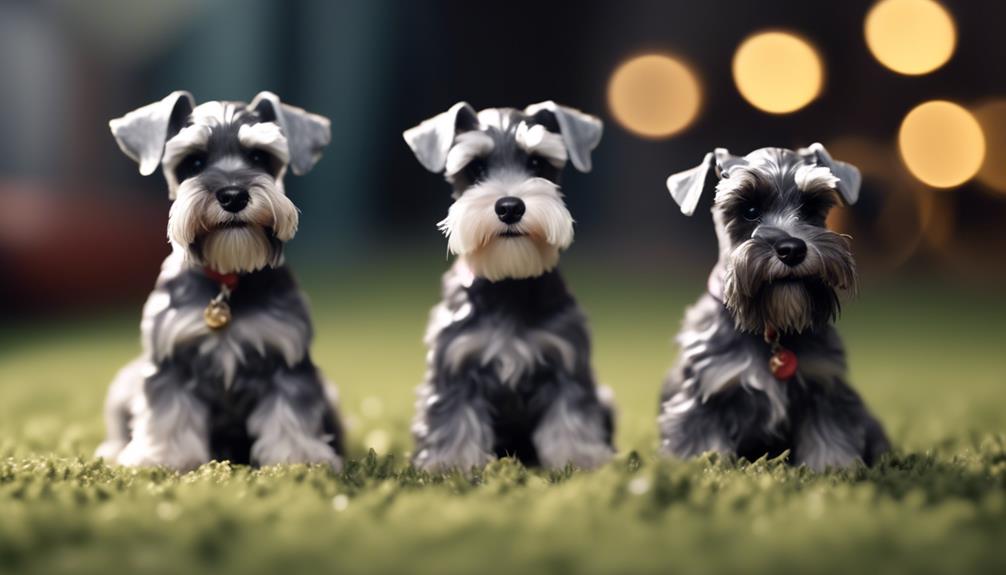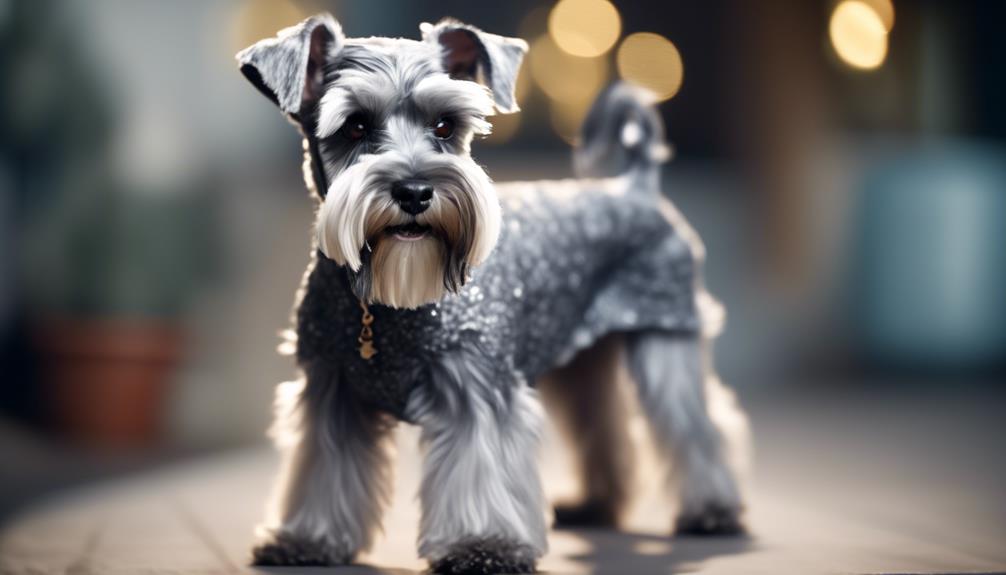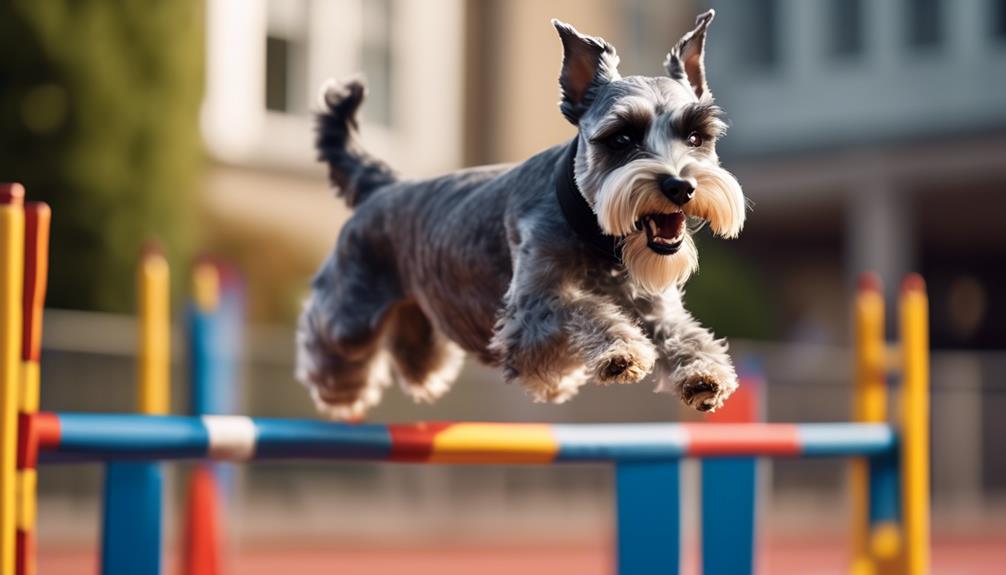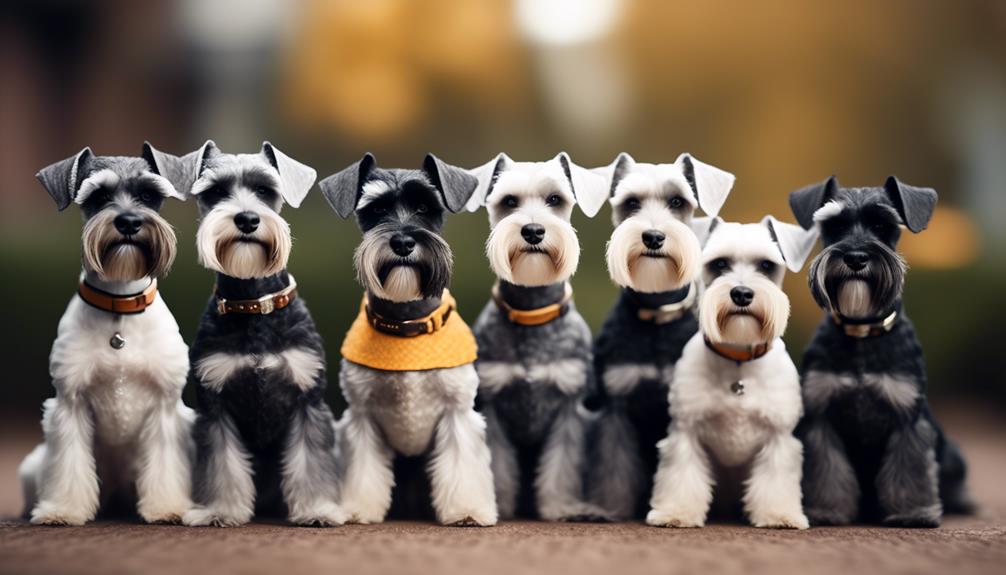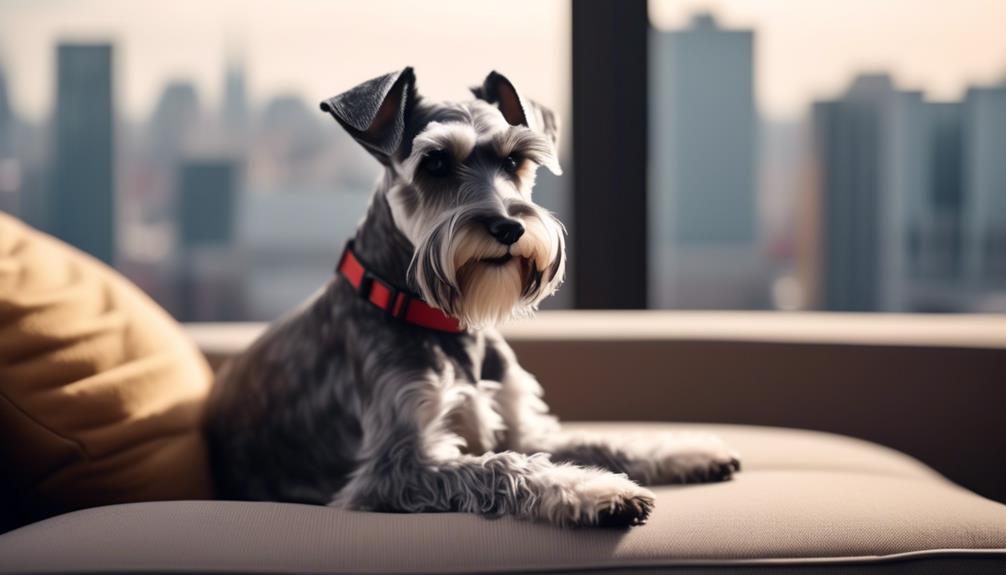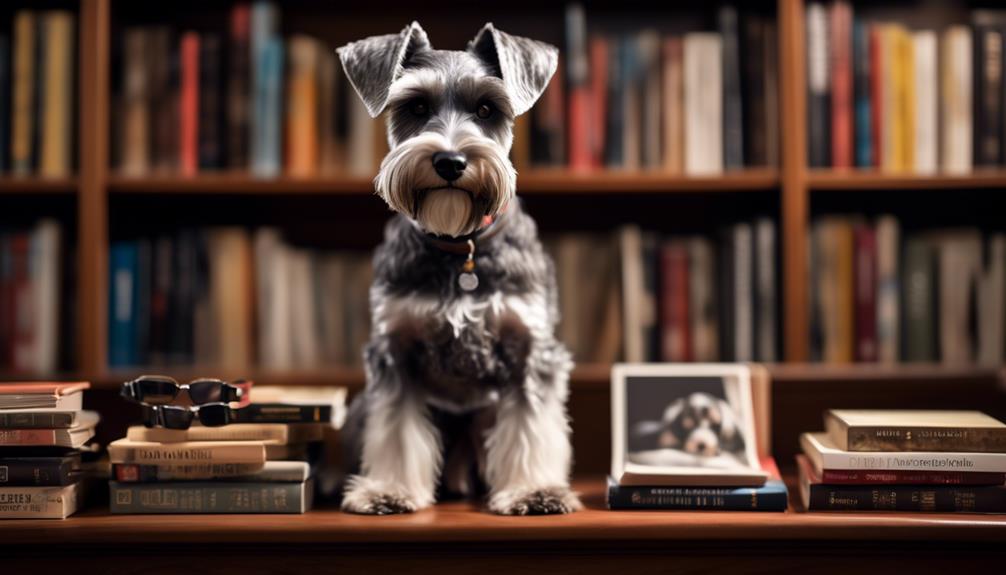As the sun sets on a quiet suburban street, a small, wiry figure trots along with an air of confidence. With its distinctive beard and bushy eyebrows, the Miniature Schnauzer stands out among its canine counterparts. But what lies beneath this charming exterior?
What are the characteristics that make the Miniature Schnauzer a beloved companion for so many? From their origin and history to their exercise needs and health concerns, this discussion will delve into the world of Miniature Schnauzers, uncovering the traits and information that make them a breed worth exploring.
So, join us as we uncover the secrets behind this spirited and captivating dog breed.
Key Takeaways
- Miniature Schnauzers are intelligent, alert, loyal, and outgoing dogs.
- They require regular exercise, training, and grooming to maintain their health and well-being.
- When choosing a Miniature Schnauzer, prioritize adoption from rescue organizations or reputable breeders who prioritize health and temperament.
- Miniature Schnauzers adapt well to apartment living, but it’s important to consider their energy levels, behavior, and compatibility with neighbors and other pets.
Origin and History
The Miniature Schnauzer has a fascinating origin and history, rooted in German breeding practices for working dogs. Developed in the late 19th century, they were created by crossing the Standard Schnauzer with smaller breeds like the Affenpinscher and Poodle. The goal was to downsize the Standard Schnauzer while maintaining its distinctive look and working abilities.
Originally, Miniature Schnauzers were bred to be versatile farm dogs, tasked with guarding livestock, catching vermin, and even herding cattle. Over time, their role shifted to that of a companion and family pet. Their intelligence, loyalty, and playful nature made them popular with families across Germany.
Eventually, they gained international recognition and became beloved pets worldwide. Today, the Miniature Schnauzer continues to be cherished for its charming personality and distinctive appearance.
Size and Lifespan
Miniature Schnauzers are small dogs, typically standing 12-14 inches tall and weighing 12-20 pounds. Despite their small size, they’ve a relatively long lifespan, living on average 12-15 years. This breed’s size and lifespan can be summarized with the following bullet points:
- Size:
- Height: 12-14 inches
- Weight: 12-20 pounds
- Lifespan: 12-15 years
Miniature Schnauzers are known for their longevity compared to other small dog breeds. Their size and lifespan make them a suitable companion for individuals or families looking for a small dog that can provide years of love and companionship.
It’s important to note that proper care, including a balanced diet, regular exercise, and routine veterinary check-ups, can contribute to a longer and healthier life for these beloved pets.
Coat and Temperament
Moving on from discussing the size and lifespan of Miniature Schnauzers, let’s now explore their distinctive coat and temperament.
Miniature Schnauzers have a wiry, double coat that comes in black, white, or salt and pepper. Their coat requires regular grooming, including daily brushing and hand-stripping every 4-6 weeks.
In terms of temperament, Miniature Schnauzers are intelligent, alert, loyal, and outgoing. They’re known for being people-oriented, making them excellent family pets. Their intelligence also makes them easy to train, although they can be stubborn at times. Positive reinforcement is the best approach for training these dogs.
With their distinctive coat and friendly temperament, Miniature Schnauzers make wonderful companions for individuals and families alike.
Exercise, Training, and Health
To maintain their overall well-being, Miniature Schnauzers require regular exercise, proper training, and attention to their health. Here are some key points to consider:
- Exercise needs: Miniature Schnauzers need 30-60 minutes of exercise per day to burn off their energy and keep them physically fit.
- Training: They’re intelligent dogs that are easy to train, but they can be stubborn at times. Positive reinforcement methods work best to motivate them.
- Health care: Regular visits to the veterinarian are essential to monitor their health. Miniature Schnauzers are generally healthy, but they can be prone to allergies, bladder stones, and skin problems.
Choosing a Miniature Schnauzer
When selecting a Miniature Schnauzer, it’s important to prioritize adopting from rescue organizations or reputable breeders. These options ensure that you’re getting a dog from a reliable source who prioritizes the health and temperament of their dogs.
Rescue organizations provide a second chance for dogs in need of a loving home, while reputable breeders conduct necessary health screenings for their puppies. It’s crucial to choose a breeder who follows ethical breeding practices and provides a nurturing environment for the puppies.
Adaptability in Apartments
Miniature Schnauzers adapt well to apartment living, making them an ideal choice for those in smaller living spaces. When considering a dog for an apartment, size isn’t the only factor to consider. Energy levels and behavior are also important factors. Here are some key points to consider when choosing a dog for an apartment:
- Consider neighbors: Opt for a pet that doesn’t excessively bark and behaves politely in shared spaces.
- Quiet and low-energy: Desirable qualities in an apartment dog include being quiet and low-energy.
- Good manners: Prioritize dogs that exhibit good manners towards other residents.
Miniature Schnauzers have a moderate energy level and are generally quiet, making them well-suited for apartment living. Their small size also means they don’t take up too much space. Additionally, they’re known for their friendly and sociable nature, making them great companions for apartment dwellers.
Feeding, Coat, Children, and Other Pets
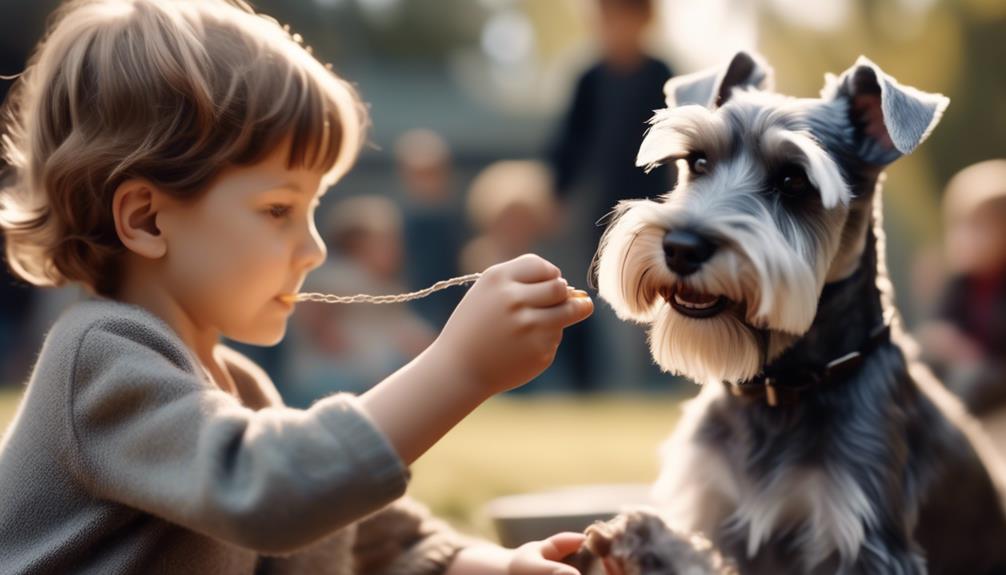
Adapting well to apartment living, Miniature Schnauzers also require proper feeding, coat care, consideration for children, and compatibility with other pets.
When it comes to feeding, it’s important to provide the recommended daily amount of high-quality dog food and ensure portion sizes are appropriate.
As for their coat, Miniature Schnauzers have a wiry, double coat that comes in different colors, such as black, white, or salt and pepper. Regular grooming, including daily brushing and hand-stripping every 4-6 weeks, is necessary to maintain their coat’s health and appearance.
When it comes to children, Miniature Schnauzers are known for being good with them, but supervision is essential to ensure a safe and positive interaction.
While they generally get along well with other dogs, they may not be compatible with small mammals. It’s always important to consider the individual temperament of each dog and their compatibility with other pets before making any introductions.
Resources and Reputable Breeders
To find a reputable Miniature Schnauzer breeder and access helpful resources, individuals should prioritize conducting thorough research and seeking guidance from established breed organizations.
Here are some steps to take when searching for a reputable breeder:
- Research breed organizations: Start by researching reputable breed organizations such as the American Kennel Club (AKC) or the Miniature Schnauzer Club of America (MSCA). These organizations provide valuable information about the breed and can help connect individuals with reputable breeders.
- Attend dog shows and events: Dog shows and events are a great way to meet breeders in person and see their dogs. It allows individuals to ask questions, observe the breeder’s interactions with their dogs, and learn more about their breeding practices.
- Ask for recommendations: Reach out to other Miniature Schnauzer owners or enthusiasts and ask for recommendations. They may be able to provide insights into reputable breeders they’ve had positive experiences with.
Frequently Asked Questions
How Much Does a Miniature Schnauzer Puppy Cost?
A miniature Schnauzer puppy can cost anywhere from $500 to $2500, depending on factors such as the breeder’s reputation, bloodline, and location. It is important to research and find a reputable breeder who prioritizes the health and well-being of their dogs.
Are Miniature Schnauzers Hypoallergenic?
Yes, Miniature Schnauzers are hypoallergenic. Their wiry double coat sheds minimally and produces less dander, making them a good choice for individuals with allergies. Regular grooming helps to minimize allergens.
Can Miniature Schnauzers Be Left Alone for Long Periods of Time?
Yes, Miniature Schnauzers can be left alone for moderate periods of time, but they are social dogs that thrive on human companionship. It’s important to provide them with mental stimulation and exercise to prevent boredom.
Do Miniature Schnauzers Require Professional Grooming?
Yes, Miniature Schnauzers require professional grooming. Regular grooming is important for their wiry, double coat. This includes daily brushing and hand-stripping every 4-6 weeks to maintain their coat’s texture and prevent matting.
Are Miniature Schnauzers Good With Cats?
Yes, Miniature Schnauzers can be good with cats. However, it is important to introduce them properly and supervise their interactions. Early socialization and training can help ensure a positive relationship between them.
What are the key differences between Miniature Schnauzers and Miniature Pinschers?
Miniature Schnauzers and Miniature Pinschers are both small and energetic breeds, but they have distinct differences. While Miniature Schnauzers are known for their distinctive beard and eyebrows, Miniature Pinschers are characterized by their sleek, muscular build. Understanding miniature pinscher breed info characteristics can help potential owners decide which breed is best for them.
Conclusion
In conclusion, the Miniature Schnauzer is a wonderful dog breed known for its intelligence, loyalty, and outgoing nature.
With their small size and friendly temperament, they make excellent companions for individuals and families.
While they require regular grooming and exercise, their adaptability to apartment living and good compatibility with children make them a popular choice.
By prioritizing adoption from rescue organizations or reputable breeders, individuals can ensure they’re getting a healthy and well-tempered Miniature Schnauzer.
